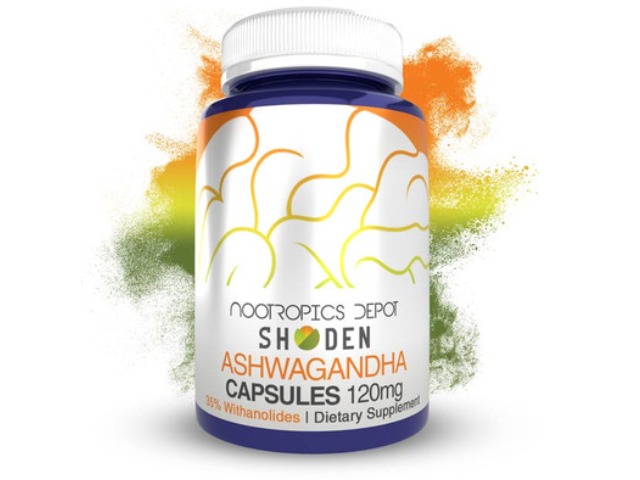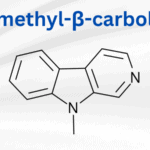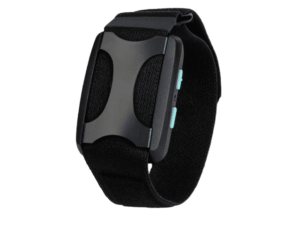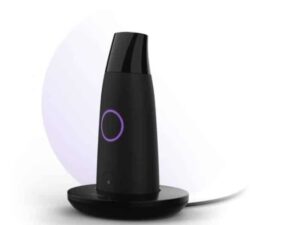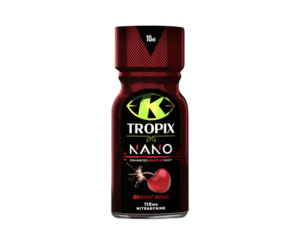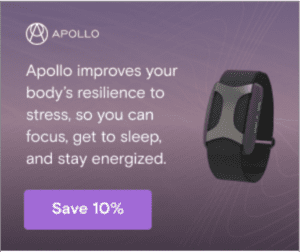Ashwagandha (Withania somnifera), also known as Indian ginseng, is an evergreen shrub native to India, the Middle East, and parts of Africa. This revered herb has been a staple in Ayurvedic medicine for thousands of years, used to treat various ailments and promote overall well-being. In recent years, Ashwagandha has gained significant popularity as a nootropic supplement, thanks to its remarkable stress-relieving properties and potential cognitive benefits.
At Holistic Nootropics, we are dedicated to exploring natural, evidence-based strategies for cognitive enhancement and mental well-being. Our philosophy centers on the intricate interplay between the mind and body, recognizing that optimal brain function is best achieved through a holistic approach that extends beyond supplementation.
In this comprehensive guide, we will delve into the science behind Ashwagandha, its potential benefits, dosing recommendations, and important considerations for those looking to incorporate this powerful herb into their wellness routine.
Biohack Your Brainpower
How Does Ashwagandha Work in the Brain?
Ashwagandha’s beneficial effects on the brain are attributed to its unique blend of bioactive compounds, particularly withanolides. These naturally occurring steroids are believed to interact with various neurotransmitter systems, influencing brain function and behavior.
One of the primary ways Ashwagandha impacts the brain is through its interaction with GABA receptors. GABA, or gamma-aminobutyric acid, is the primary inhibitory neurotransmitter in the central nervous system, responsible for reducing neuronal excitability and promoting a sense of calm. By enhancing GABA signaling, Ashwagandha may help alleviate anxiety and promote relaxation.
In addition to its effects on GABA, Ashwagandha has been shown to modulate serotonin levels in the brain. Serotonin is a key neurotransmitter involved in mood regulation, sleep, and appetite. By optimizing serotonin signaling, Ashwagandha may help improve mood and emotional well-being.
Ashwagandha also demonstrates neuroprotective properties, potentially safeguarding brain cells from damage caused by oxidative stress and inflammation. This protective effect may have implications for the prevention and management of neurodegenerative disorders like Alzheimer’s and Parkinson’s disease.
Buy Shoden® Ashwagandha Extract Capsules by Nootropics Depot
Nootropics Depot’s Shoden® Ashwagandha Extract Capsules are crafted to enhance wellness. Ashwagandha is renowned for its stress-reducing and vitality-boosting properties. These capsules use a highly bioavailable form, ensuring maximum benefits. Made with attention to purity and potency, they are an ideal choice for those seeking a natural way to manage stress and boost vitality.
Pros
- Stress reduction
- Vitality booster
- Highly bioavailable
- Quality manufacturing
Cons
- Varies by individual
- Not a complete solution
- Regular intake needed
- Potential cost premium
Ashwagandha Benefits
The therapeutic potential of Ashwagandha is vast, with a growing body of research supporting its use for a wide range of health concerns. Some of the most notable benefits of Ashwagandha include:
- Stress and Anxiety Reduction: Ashwagandha is perhaps best known for its ability to reduce stress and anxiety. A randomized, double-blind, placebo-controlled study published in the Indian Journal of Psychological Medicine found that a high-concentration full-spectrum Ashwagandha root extract safely and effectively improved resistance towards stress and self-assessed quality of life.[1]
- Mood Support: Emerging evidence suggests that Ashwagandha may be beneficial for those struggling with depression. Its mood-enhancing effects are thought to be mediated by its ability to regulate neurotransmitters like serotonin and GABA.
- Cognitive Enhancement: Ashwagandha has been shown to improve various aspects of cognitive function, including memory and focus. A study published in the Journal of Dietary Supplements found significant improvements in memory and cognitive functioning after 90 days of supplementation in adults with high levels of stress.[2] Learn More: “Best Nootropics For Studying, Memory, and Focus”
- Male Fertility and Testosterone Support: Ashwagandha has been traditionally used to enhance male fertility and libido. Modern research suggests that it may indeed boost testosterone levels and improve sperm quality in men.
- Blood Sugar Regulation: Some studies indicate that Ashwagandha may help lower blood sugar levels, making it a potential adjunct therapy for those with diabetes or insulin resistance.
- Anti-inflammatory and Immune-Boosting Effects: Ashwagandha contains potent anti-inflammatory and antioxidant compounds that may help strengthen the immune system and protect against cellular damage.
Ashwagandha Dosage and Safety
When it comes to dosing Ashwagandha, it’s essential to consider the specific extract and its concentration of withanolides, the primary active compounds in the herb. Standardized extracts like KSM-66 and Sensoril are commonly used in supplements, with typical dosages ranging from 300-600 mg per day.
It’s generally recommended to start with a lower dose and gradually increase as needed and tolerated. As with any supplement, it’s crucial to consult with a healthcare professional before starting Ashwagandha, especially if you have pre-existing health conditions or are taking medications.
While Ashwagandha is generally considered safe when used appropriately, some people may experience side effects such as:
- Drowsiness
- Stomach upset
- Diarrhea
- Vomiting
In rare cases, Ashwagandha has been associated with liver injury.[3] If you experience any adverse reactions, discontinue use and consult your healthcare provider.
Certain individuals should avoid Ashwagandha or use it with caution, including:
- Pregnant and breastfeeding women
- People with autoimmune disorders like rheumatoid arthritis, lupus, or Hashimoto’s thyroiditis
- Those with thyroid disorders
- Individuals scheduled for surgery (due to Ashwagandha’s potential to slow down the central nervous system)
Ashwagandha may also interact with certain medications, including sedatives, antidepressants, and immunosuppressants. Always inform your healthcare provider about any supplements you are taking to avoid potential interactions.
Where to Buy Ashwagandha
When purchasing Ashwagandha supplements, it’s crucial to choose a reputable brand that prioritizes quality, purity, and transparency. Look for products that have undergone third-party testing to ensure they are free from contaminants and contain the listed ingredients in the specified amounts.
One of the most well-researched and trusted Ashwagandha extracts is KSM-66, a full-spectrum extract derived from the roots of the plant. KSM-66 has been clinically studied for its effects on stress, anxiety, and cognitive function, making it a popular choice among nootropic enthusiasts.
Some reputable brands that offer high-quality Ashwagandha supplements include:

Sensoril Ashwagandha Extract Capsules | 125mg by Nootropics Depot

Buy Sensoril Ashwagandha Powder | Read Benefits and by Nootropics Depot
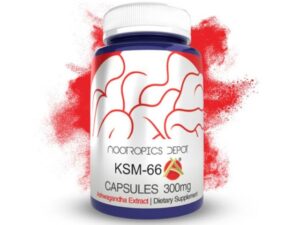
Nootropics Depot Buy Ksm-66 Ashwagandha Extract Capsules 300mg
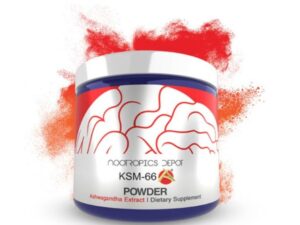
Nootropics Depot Buy Ksm-66 Ashwagandha Extract Powder
Ashwagandha vs Other Adaptogenic Herbs
Ashwagandha is just one of many adaptogenic herbs that have gained popularity in recent years for their stress-reducing and health-promoting properties. Other notable adaptogens include:
- Rhodiola Rosea: Known for its energy-boosting and fatigue-fighting effects, Rhodiola is often used to enhance physical and mental performance. Learn More: Rhodiola Rosea: Benefits, Dosing, Where To Buy, And More!
- Bacopa Monnieri: Prized for its cognitive-enhancing properties, Bacopa has been shown to improve memory, learning, and information processing speed. Learn More: Bacopa Monnieri: Benefits, Dosing, Where To Buy, And More!
- Ginseng: Both American and Asian ginseng have been used for centuries to boost energy, reduce stress, and enhance cognitive function.
While each adaptogen has its own unique set of benefits, they all share the common goal of helping the body better cope with stress and maintain homeostasis. Some people may find that combining Ashwagandha with other adaptogens provides synergistic effects, while others may prefer to focus on one herb at a time to assess their individual response.
Ashwagandha Stacks and Combinations
Ashwagandha can be a valuable addition to various nootropic stacks, depending on your specific goals and needs. Some popular combinations include:
- Ashwagandha and Caffeine: Combining the calming effects of Ashwagandha with the stimulating properties of caffeine may help provide a balanced energy boost without the jitters or crash. Learn More: Why Combining L-Theanine and Caffeine Is The Perfect Nootropic
- Ashwagandha and L-Theanine: Both known for their stress-reducing effects, Ashwagandha and L-theanine may work synergistically to promote relaxation and mental clarity.
- Ashwagandha in Comprehensive Nootropic Stacks: Many pre-formulated nootropic blends include Ashwagandha as part of a broader spectrum of cognitive-enhancing ingredients. Learn More: The Best Nootropic Stack For Ultimate Brain Performance
As with any new supplement regimen, it’s essential to start slowly and assess your individual response before adding additional compounds. Keep in mind that while certain combinations may work well for some people, others may find that a more minimalist approach works best for their unique physiology and needs.
Ashwagandha Discussions on Reddit
One of the best ways to gather insights on the real-world experiences of Ashwagandha users is by exploring discussions on Reddit. We’ve scoured through some popular threads to bring you some valuable information shared by the Reddit community.
Personal Experiences and Anecdotes
I have been taking ksm66 from GNC for over a year now. Sleep has been better and over all mood has improved 10 fold. I also have taken two weeks off every 6 weeks.
u/freakin_r1can in discussion ‘Anyone wants to share their personal experience with Ashwagandha and what it did for you?’
Many users report positive experiences with Ashwagandha, noting improvements in sleep quality, mood, and overall well-being. However, it’s essential to keep in mind that individual results may vary, and what works for one person may not work for another. Assess your individual response and minimize the risk of side effects.
Cycling and Dosage Strategies
I recommend cycling it. 2 months on 2 months off. And start with low dose like 250mg and slowly increase if you need.
u/[deleted] in discussion ‘Anyone wants to share their personal experience with Ashwagandha and what it did for you?’
It crashed my cortisol and I felt exhausted all the time. Granted, I was taking a mega dose.
u/bbs540 in discussion ‘Anyone wants to share their personal experience with Ashwagandha and what it did for you?’
Potential Side Effects and Interactions
While Ashwagandha is generally well-tolerated, some users have reported adverse effects, particularly when taking high doses or using the herb for extended periods. Common side effects include fatigue, digestive issues, and headaches. It’s crucial to be mindful of your dosage and listen to your body’s feedback when incorporating any new supplement into your routine.
Ashwagandha FAQ
To help address some of the most common questions about Ashwagandha, we’ve compiled a brief FAQ section:
1. Is Ashwagandha safe for long-term use?
While Ashwagandha is generally considered safe when used as directed, long-term safety data is limited. Many experts recommend cycling Ashwagandha, taking breaks every few months to avoid potential tolerance or adverse effects.
2. Can Ashwagandha help with anxiety and panic attacks?
Yes, Ashwagandha has been shown to reduce anxiety and stress in several clinical studies. However, if you experience severe anxiety or panic attacks, it’s essential to consult with a mental health professional for proper guidance and treatment.
3. What is the best time of day to take Ashwagandha?
The optimal time to take Ashwagandha may depend on your specific goals and how your body responds to the herb. Some people find that taking Ashwagandha in the morning helps them feel more balanced and energized throughout the day, while others prefer to take it in the evening to promote relaxation and improve sleep quality.
4. Can Ashwagandha cause weight gain?
There is limited evidence to suggest that Ashwagandha directly causes weight gain. However, some users may experience increased appetite as a result of reduced stress and improved overall well-being. Maintaining a balanced diet and regular exercise routine can help manage weight while using Ashwagandha.
5. How long does it take for Ashwagandha to start working?
The time it takes for Ashwagandha to produce noticeable effects can vary from person to person. Some users report feeling the benefits within a few days, while others may need several weeks of consistent use to experience significant improvements in stress levels, anxiety, or cognitive function.
Conclusion
Ashwagandha is a powerful adaptogenic herb with a long history of use in Ayurvedic medicine. Its potential benefits for stress reduction, cognitive enhancement, and overall well-being make it an attractive option for those seeking natural ways to support their mental health and performance.
As with any new supplement, it’s essential to approach Ashwagandha with caution and mindfulness. Start with a low dose, monitor your body’s response, and consult with a healthcare professional if you have any concerns or pre-existing health conditions.
At Holistic Nootropics, our mission is to provide accurate, science-backed information to help you make informed decisions about your health and well-being. We believe that the key to unlocking your cognitive potential lies in a holistic approach that encompasses nutrition, lifestyle, and targeted supplementation.
If you have any experiences, insights, or questions about Ashwagandha, we’d love to hear from you in the comments below. Together, we can navigate the fascinating world of nootropics and build a supportive community dedicated to optimizing our mental health and performance.
References
[1] Chandrasekhar K, Kapoor J, Anishetty S. A prospective, randomized double-blind, placebo-controlled study of safety and efficacy of a high-concentration full-spectrum extract of ashwagandha root in reducing stress and anxiety in adults. Indian J Psychol Med. 2012 Jul;34(3):255-62. doi: 10.4103/0253-7176.106022. https://www.ncbi.nlm.nih.gov/pmc/articles/PMC3573577/
[2] Choudhary D, Bhattacharyya S, Bose S. Efficacy and Safety of Ashwagandha (Withania somnifera (L.) Dunal) Root Extract in Improving Memory and Cognitive Functions. J Diet Suppl. 2017 Nov 2;14(6):599-612. doi: 10.1080/19390211.2017.1284970. https://pubmed.ncbi.nlm.nih.gov/28471731/
[3] Björnsson HK, Björnsson ES, Avula B, et al. Ashwagandha-induced liver injury: A case series from Iceland and the US Drug-Induced Liver Injury Network. Liver Int. 2020 Apr;40(4):825-829. doi: 10.1111/liv.14393. https://pubmed.ncbi.nlm.nih.gov/32064102/
Cycling Ashwagandha, or taking breaks from supplementation, is a common approach to avoid potential tolerance or adverse effects associated with long-term use. Starting with a lower dose and gradually increasing as needed is also a wise strategy to

